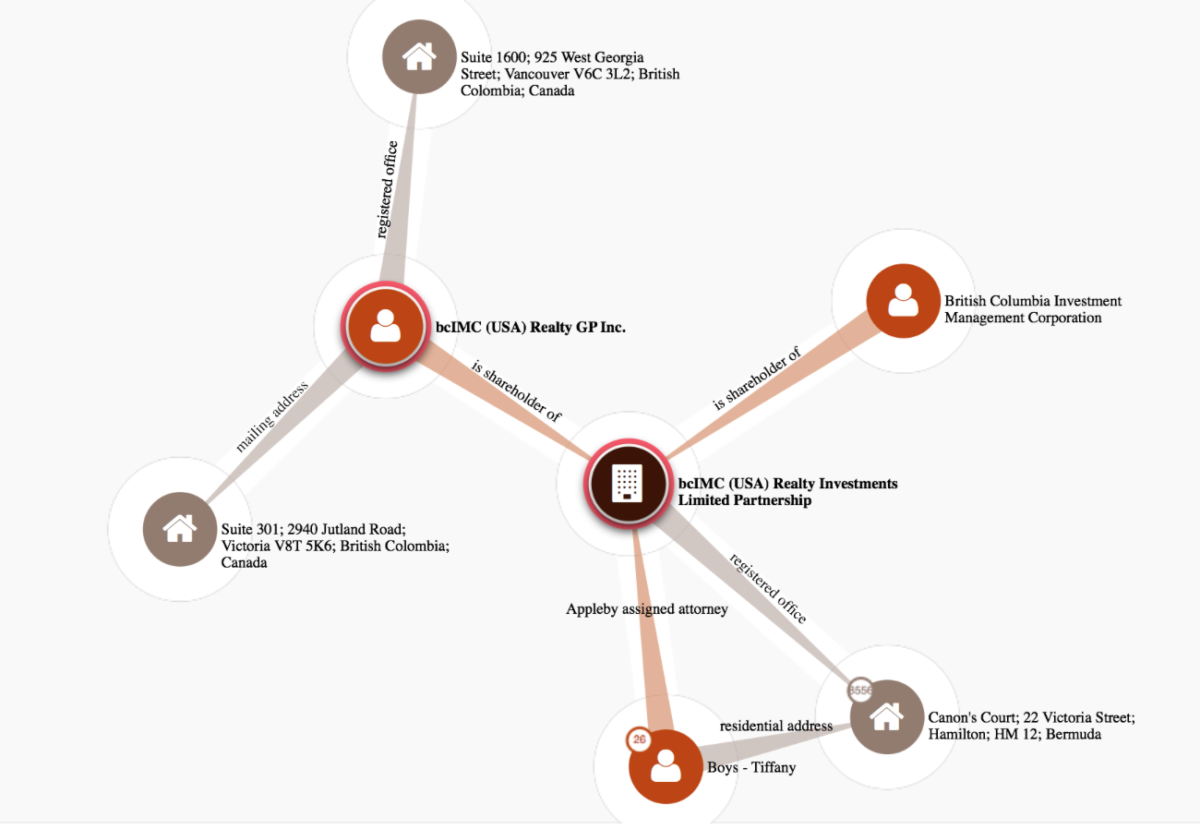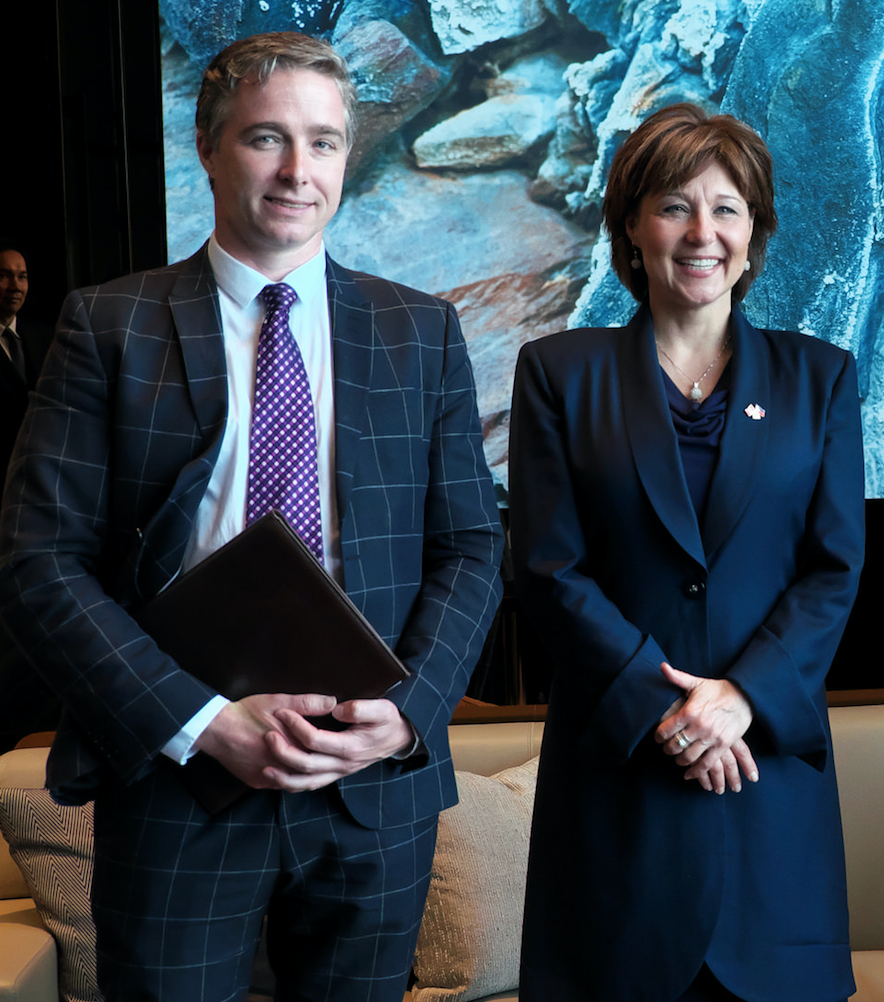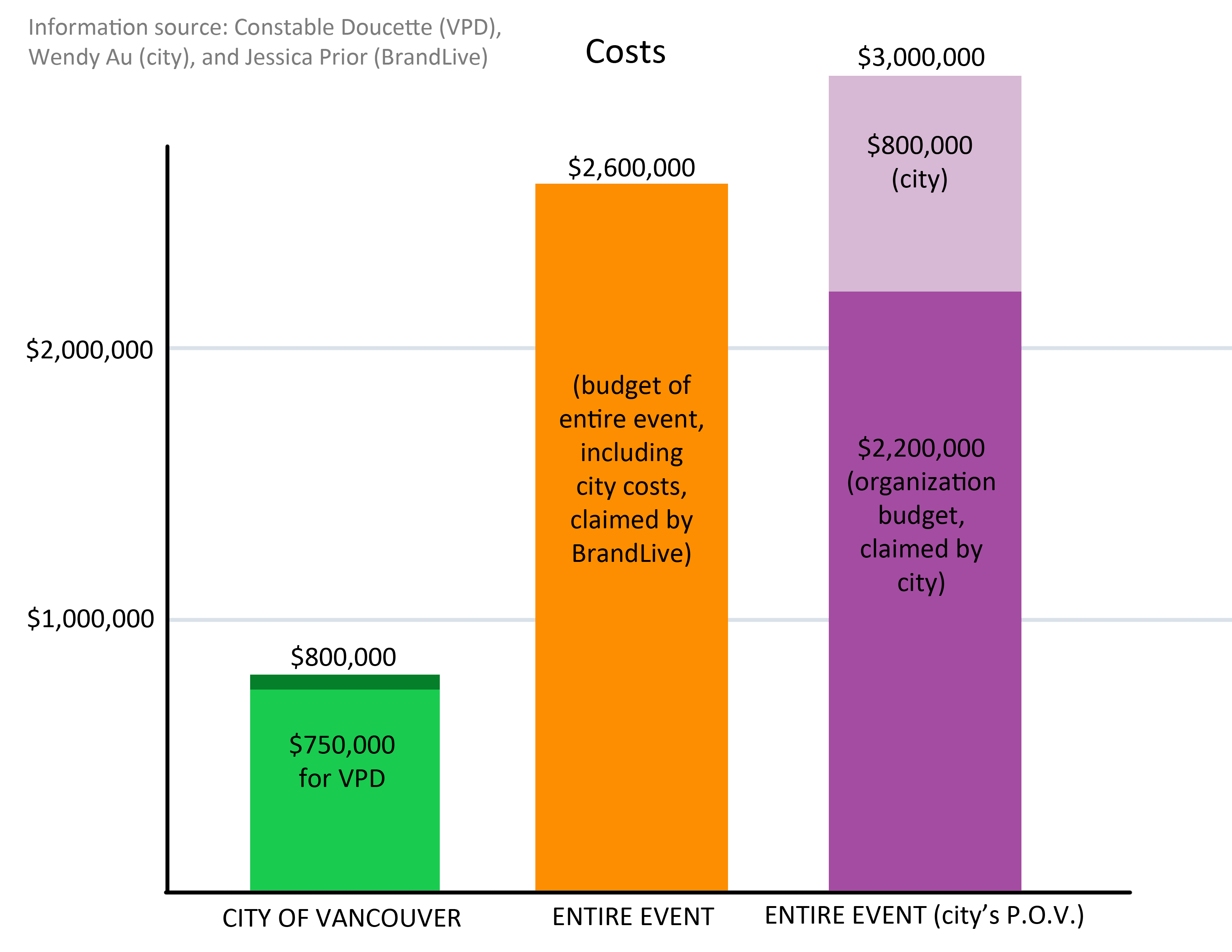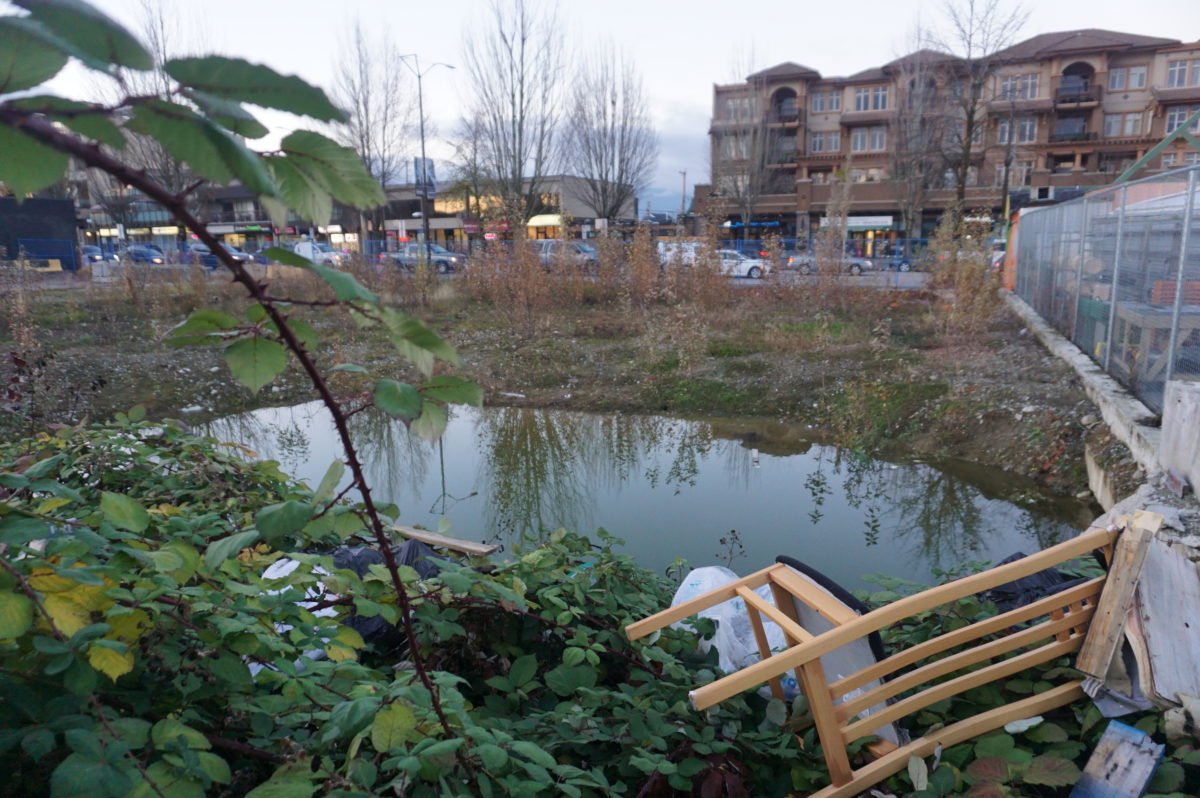Bob Mackin
Epta Properties, the Vancouver developer that demolished a Royal Canadian Legion hall in North Burnaby, but failed to build a new one, is negotiating to buy prime land in Greater Palm Springs, theBreaker has learned.
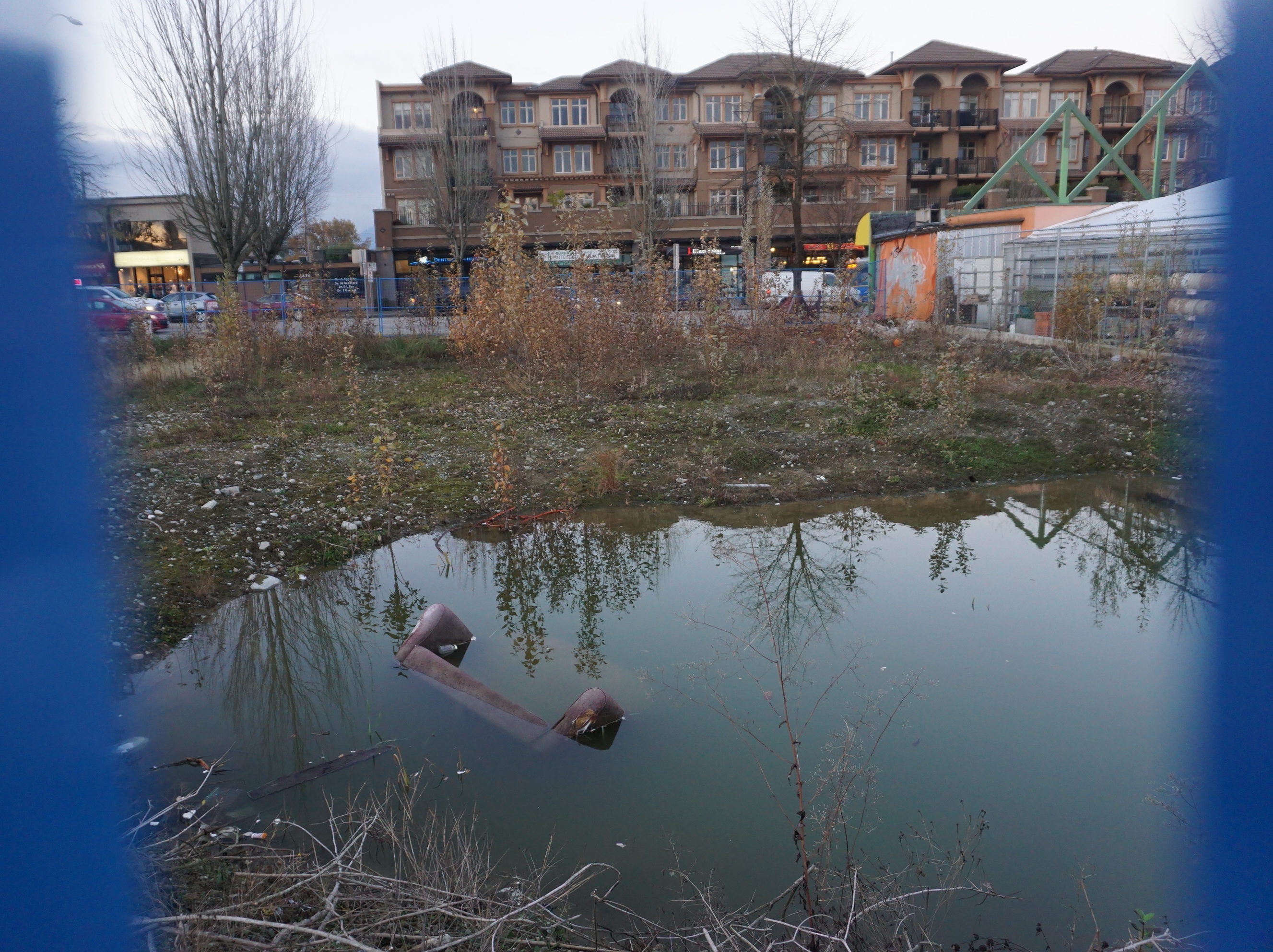
Epta Properties was supposed to redevelop the former Royal Canadian Legion hall site in Burnaby Heights. (Mackin)
Jeff Woolson, executive vice-president of CBRE’s golf and resort group, declined to comment, other than to say the land “is under contract.”
A year ago, Business in Vancouver reported on Epta’s broken promise to build a five-storey, mixed-use building with two-dozen condos on the former site of the 1955-built, branch 148 hall. It was supposed to be completed in summer 2015 and called Centro, with a brand new Royal Canadian Legion canteen for war veterans and their friends and families to sip, socialize and play darts.
Epta, which is the Greek word for seven, never put a shovel in the ground.
North Burnaby’s Royal Canadian Legion, suffering from declining membership and increased competition for beer sales, chose Epta to redevelop the site in 2013. Epta paid the Legion’s $145,000 tax bill through the end of 2014. The company also took a $3.1 million loan on the property, but later claimed $2.82 million in costs, including a $700,000 “development management fee.”
Epta got bogged down in its own financial problems and developed nothing for the Legion. Instead of suing Epta or giving it more time to begin construction, Legion members voted to sell the property to Beedie Development Corp., even if that meant the canteen plan would fall by the wayside.
The vacant 4356 Hastings lot is surrounded by poorly secured Super Save construction fences. Coast Mountain buses, zoomed east toward Willingdon, displaying the “Lest We Forget” message on the eve of Remembrance Day. A small pond, containing a discarded sofa, has formed among the weed and shrub-riddled ruins of the legion hall.
Centro was supposed to be one of three Epta projects in Burnaby Heights. Madison (4301 Hastings) and Montage (438 Gamma) were the other two.
Madison was completed in controversy. Epta’s two partners — Carey Siddoo’s Beta Properties and Steven Bosa’s SMB Holdings — sued at the end of September 2016. They alleged Epta, its related company Apollo Management Group, and president Bill Tsakumis and his sons/vice-presidents Angelo, Alex B. and Chris Tsakumis committed breach of trust, breach of fiduciary duty and unauthorized borrowing.
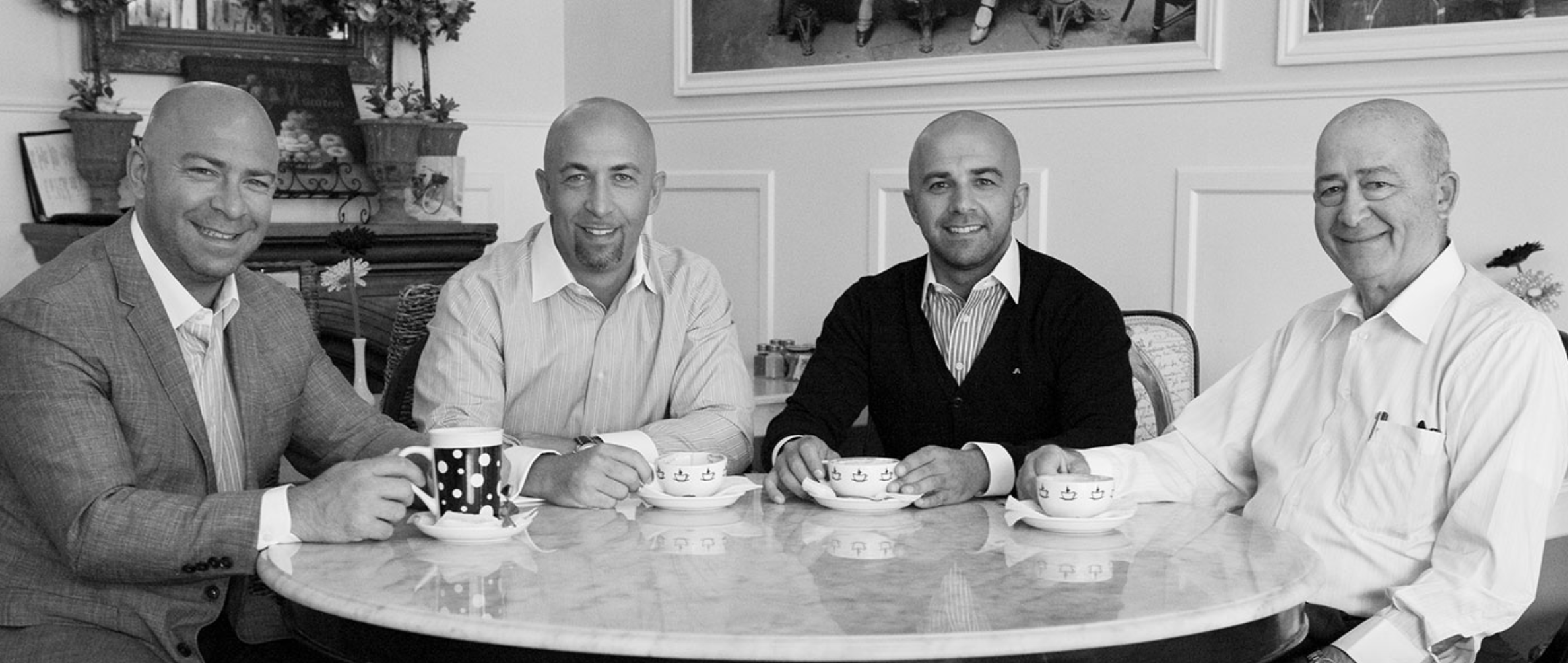
Alex B. (left), Chris, Angelo and Bill Tsakumis (Epta).
Contacted on his mobile phone on Nov. 9, Angelo Tsakumis said he was busy and would call theBreaker back. No such call was received before deadline on Nov. 10. Alex B. Tsakumis did not respond to interview requests.
Their cousin is former media commentator Alex G. Tsakumis, the CEO of Trigate Properties Group. Reached by phone in the U.S., he emphatically distanced himself from Epta.
“Trigate is an entirely separate company from Epta with absolutely no overlapping interests or directors, not now or in the past,” Alex G. Tsakumis said. “The two companies couldn’t possibly be more different in vision or capacity. We have never had anything to do with Epta Properties, and we will never have anything to do with Epta Properties — ever, period.”
Beta and SMB’s statement of claim said Madison should have shown a $1.9 million profit, but instead had $737,148 in loans owing. The statement of claim said there were $17.7 million in sales, but $521,000 in debts, liabilities and obligations.
The Epta defence statement said the development recorded losses in 2014 and 2015 and the cost of sales was $18.24 million. Epta denied funds from the development partnership were forwarded to or used by the Epta-related cranberry farming company, Apollo.
On Aug. 4, 2017, Best Personnel filed a statement of claim for $65,000 plus interest against Epta and 1089330 B.C. Ltd. over money owing from Epta’s Montage.

Epta-developed Montage in Burnaby (Mackin)
The lawsuit said Best agreed to provide Epta workers for between $19.95 an hour (general construction labourers) and $34.95 an hour (carpenters), but “Epta has refused or neglected to make payment, despite demand.”
Epta sold Montage in October 2016 to 1089330 B.C. Ltd., a numbered company whose CEO, Toby Chu, and two other directors are executives with CIBT Education Group, the parent company of Sprott Shaw College.
Court Services Online shows Epta has been a party to 40 court actions in British Columbia — 24 of which as the defendant — since 2008. One of the civil cases involved the insolvency of Apollo, which started in 1985 as a Greek wine importer and morphed into a major cranberry grower for industry leader Ocean Spray.
Apollo bought 184 acres on Barnston Island in 1989 and leased the land to Opus Cranberries from 1994 to 2007, when Apollo bought Opus and nearly 100 more acres on the unincorporated Fraser River island west of the Golden Ears Bridge. David Emri, who owns more than half the island, favours rezoning from the Agricultural Land Reserve to industry, for logistics or warehousing.
In 2014, while Epta was immersing itself in Burnaby Heights, Apollo defaulted on loan payments and receiver FTI Consulting Canada was appointed.
Court filings show that during a seven-year period, Apollo advanced $5.9 million from its cranberry farming cashflow to related parties, “with the majority of the advances made to Epta Properties Ltd.”
“As a result of the related party loan advances the company was unable to make its loan payment to Farm Credit in November 2013.”
Farm Credit issued a default notice in December 2013, but agreed to waive the breach for a year to allow Apollo to reorganize. That was short-lived. Apollo failed to make its next scheduled loan payment to Farm Credit in February 2014.
The court documents also say that Apollo arranged a $4 million loan from First West Credit Union, “however, the residual funds were advanced by Apollo to Epta resulting in the company being unable to pay the scheduled quarterly payments to Farm Credit Canada in August and November of 2014.”
Farm Credit demanded repayment in January 2015.

Cranberry farmland on Barnston Island formerly owned by a company related to Epta (Cushman Wakefield)
Apollo owed $23.626 million to secured creditors, primarily Farm Credit ($17.3 million) and First West ($4 million). In July 2015, Apollo reached a deal to sell the land, buildings, equipment, permits and contracts to D.R. Barnston Holdings Ltd. for $24.875 million, with a Feb. 11, 2016 closing date.
Sometime between Nov. 3 and 7, however, FTI quietly removed the Apollo listing and related documents from its insolvency cases website without notice or explanation. Several older, dormant or completed insolvency cases remain on FTI’s public website, however.
When contacted by theBreaker, FTI’s Vancouver managing director Craig Munro would not comment on the removal of Apollo.
“The terms of this proposal were fulfilled and there are no outstanding matters,” Munro said by email.
Support theBreaker.news for as low as $2 a month on Patreon. Find out how. Click here.
Bob Mackin
Epta Properties, the Vancouver developer








